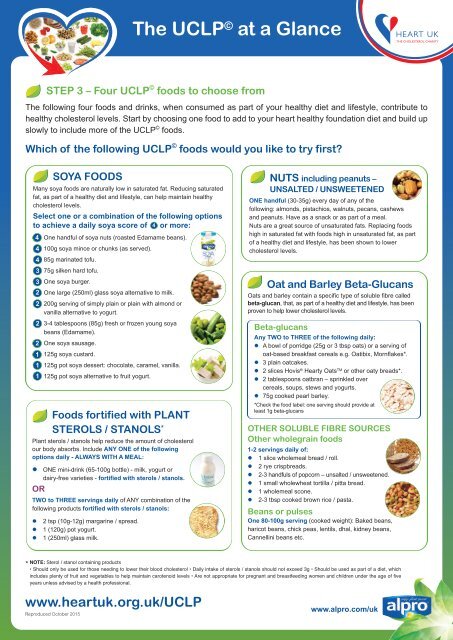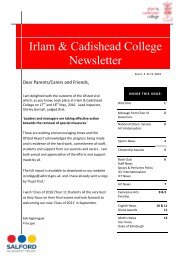Salford Heart Care
february-2017-Newsletter
february-2017-Newsletter
Create successful ePaper yourself
Turn your PDF publications into a flip-book with our unique Google optimized e-Paper software.
The UCLP © at a Glance<br />
STEP 3 – Four UCLP © foods to choose from<br />
The following four foods and drinks, when consumed as part of your healthy diet and lifestyle, contribute to<br />
healthy cholesterol levels. Start by choosing one food to add to your heart healthy foundation diet and build up<br />
slowly to include more of the UCLP © foods.<br />
Which of the following UCLP © foods would you like to try first?<br />
SOYA FOODS<br />
Many soya foods are naturally low in saturated fat. Reducing saturated<br />
fat, as part of a healthy diet and lifestyle, can help maintain healthy<br />
cholesterol levels.<br />
Select one or a combination of the following options<br />
to achieve a daily soya score of 4 or more:<br />
4 One handful of soya nuts (roasted Edamame beans).<br />
4 100g soya mince or chunks (as served).<br />
4 85g marinated tofu.<br />
3 75g silken hard tofu.<br />
3 One soya burger.<br />
2 One large (250ml) glass soya alternative to milk.<br />
2 200g serving of simply plain or plain with almond or<br />
vanilla alternative to yogurt.<br />
2 3-4 tablespoons (85g) fresh or frozen young soya<br />
beans (Edamame).<br />
2 One soya sausage.<br />
1 125g soya custard.<br />
1 125g pot soya dessert: chocolate, caramel, vanilla.<br />
1 125g pot soya alternative to fruit yogurt.<br />
Foods fortified with PLANT<br />
STEROLS / STANOLS *<br />
Plant sterols / stanols help reduce the amount of cholesterol<br />
our body absorbs. Include ANY ONE of the following<br />
options daily - ALWAYS WITH A MEAL:<br />
l ONE mini-drink (65-100g bottle) - milk, yogurt or<br />
dairy-free varieties - fortified with sterols / stanols.<br />
OR<br />
TWO to THREE servings daily of ANY combination of the<br />
following products fortified with sterols / stanols:<br />
l<br />
l<br />
l<br />
2 tsp (10g-12g) margarine / spread.<br />
1 (120g) pot yogurt.<br />
1 (250ml) glass milk.<br />
NUTS including peanuts –<br />
UNSALTED / UNSWEETENED<br />
ONE handful (30-35g) every day of any of the<br />
following: almonds, pistachios, walnuts, pecans, cashews<br />
and peanuts. Have as a snack or as part of a meal.<br />
Nuts are a great source of unsaturated fats. Replacing foods<br />
high in saturated fat with foods high in unsaturated fat, as part<br />
of a healthy diet and lifestyle, has been shown to lower<br />
cholesterol levels.<br />
Oat and Barley Beta-Glucans<br />
Oats and barley contain a specific type of soluble fibre called<br />
beta-glucan, that, as part of a healthy diet and lifestyle, has been<br />
proven to help lower cholesterol levels.<br />
Beta-glucans<br />
Any TWO to THREE of the following daily:<br />
l A bowl of porridge (25g or 3 tbsp oats) or a serving of<br />
oat-based breakfast cereals e.g. Oatibix, Mornflakes*.<br />
l 3 plain oatcakes.<br />
l 2 slices Hovis ® <strong>Heart</strong>y Oats TM or other oaty breads*.<br />
l 2 tablespoons oatbran – sprinkled over<br />
cereals, soups, stews and yogurts.<br />
l 75g cooked pearl barley.<br />
*Check the food label: one serving should provide at<br />
least 1g beta-glucans<br />
OTHER SOLUBLE FIBRE SOURCES<br />
Other wholegrain foods<br />
1-2 servings daily of:<br />
l 1 slice wholemeal bread / roll.<br />
l 2 rye crispbreads.<br />
l 2-3 handfuls of popcorn – unsalted / unsweetened.<br />
l 1 small wholewheat tortilla / pitta bread.<br />
l 1 wholemeal scone.<br />
l 2-3 tbsp cooked brown rice / pasta.<br />
Beans or pulses<br />
One 80-100g serving (cooked weight): Baked beans,<br />
haricot beans, chick peas, lentils, dhal, kidney beans,<br />
Cannellini beans etc.<br />
NOTE: Sterol / stanol containing products<br />
*<br />
• Should only be used for those needing to lower their blood cholesterol • Daily intake of sterols / stanols should not exceed 3g • Should be used as part of a diet, which<br />
includes plenty of fruit and vegetables to help maintain carotenoid levels • Are not appropriate for pregnant and breastfeeding women and children under the age of five<br />
years unless advised by a health professional.<br />
www.heartuk.org.uk/UCLP<br />
Reproduced October 2015<br />
www.alpro.com/uk





